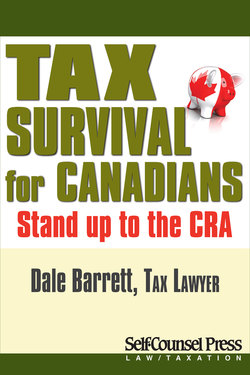Читать книгу Tax Survival for Canadians - Dale Barrett - Страница 15
На сайте Литреса книга снята с продажи.
2.7 Information gathered from the taxpayer
ОглавлениеInformation is gathered from the taxpayers at the time of filing, and at the time of any subsequent review of their returns.
Taxpayers are required to file a return if they owe any taxes to the CRA for the relevant reporting period, or if they have been requested to file by the CRA. There are also various other reasons why a taxpayer may be required to file a return, which are discussed in Chapter 3.
If there is no tax payable, and if a taxpayer is not caught by one of these reasons, then no return needs to be filed, and thus the CRA will not gather any information from the taxpayer for that given year — that is unless the CRA performs an audit for that year.
According to section 150(1) of the Income Tax Act> (ITA), annual tax returns must be filed by taxpayers in the prescribed form, which means providing the CRA with certain data points (i.e., each figure in a tax return is a data point, such as CPP contributions and taxes deducted at source). Filed returns should include documentation to support relevant income and expenses; however, detailed books and records themselves are not to be included with the filing. Section 230 of the ITA explains that although not all information is required to be filed, it is essential that the taxpayer maintain these books and records of accounts in case of later review.
Once the returns have been provided by the taxpayer, and either before or after issuance of the initial Notice of Assessment, the CRA may seek further information regarding the taxpayer’s tax obligations. The CRA may simply request additional information or may audit the taxpayer on either a narrow or broad basis. Depending on the type of audit, the auditor may focus narrowly on specific issues, or investigate on more of a large-scale review, auditing all aspects of the taxpayer’s finances, including personal and business finances.
